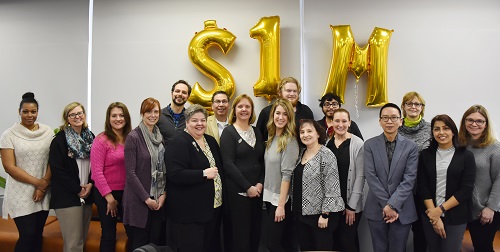February 20, 2019
Triton celebrates $1 million in student savings through Low Cost/No Cost Textbook initiative

Triton College marked a monumental milestone this semester, as its innovative Low Cost/No Cost Textbook Alternatives Program crossed the threshold of saving students $1 million on textbooks and course materials.
The program launched in 2013 with support from a grant from the U.S. Department of Labor.
The goal of the initiative is to better prepare students for success by providing access to high quality textbooks and learning materials, accessible through the Triton College Library. The growing collection includes open source textbooks and other resources including relevant, current articles from databases for faculty to include in course materials. Copies of publisher textbooks are also available in the Library and accessible to students.
The open source materials were first incorporated into online horticulture courses. Since then, the program has expanded to include rhetoric, criminal justice and chemistry courses among others. The program saved students more than $200,000 on textbooks and course materials during the fall 2018 semester alone.
Workshops are held regularly to support faculty who wish to incorporate open source course materials into their classes.
“Once we have an opportunity to have a dialogue with faculty, they realize that there are high quality resources available that are created by faculty and reviewed by faculty at institutions across the country – they become excited to learn more about it,” said faculty librarian Lauren Kosrow, who co-chairs Triton’s Low Cost/No Cost Textbook Alternatives Committee.
English Department faculty member Joe Klein, who also serves as committee co-chair, uses open source materials in his rhetoric courses.
“This has been a huge tool. It has made my instruction so much better,” Klein says. “It has given me the flexibility to choose and curate materials based on what I feel the students actually need.”
In addition to making college more affordable, the program contributes to the overall learning experience of students. A recent survey among Triton College students showed that 94 percent of students agree the course materials were easily accessible and 98 percent would recommend the course materials for future classes.
Carlos Garcia Sanchez, of Northlake, took Klein’s Rhetoric 101 course as a freshman.
“It was a great help to not have to buy a textbook. Also, all of the PowerPoints and PDF files for the class were easily accessible on blackboard, which not only saved a lot of money, it also saved paper,” Garcia Sanchez said.
Garcia Sanchez, now a sophomore, estimates he’s personally saved several hundred dollars on textbook costs during his time at Triton.
According to College Board, a nonprofit organization, community college students spent more than $1,400 on books and supplies in 2018. Data from the Bureau of Labor Statistics indicates textbook costs have risen by more than 800 percent in the past 40 years.
For more information on Triton’s Low Cost/No Cost Textbook Initiative, visit Library.Triton.edu.
